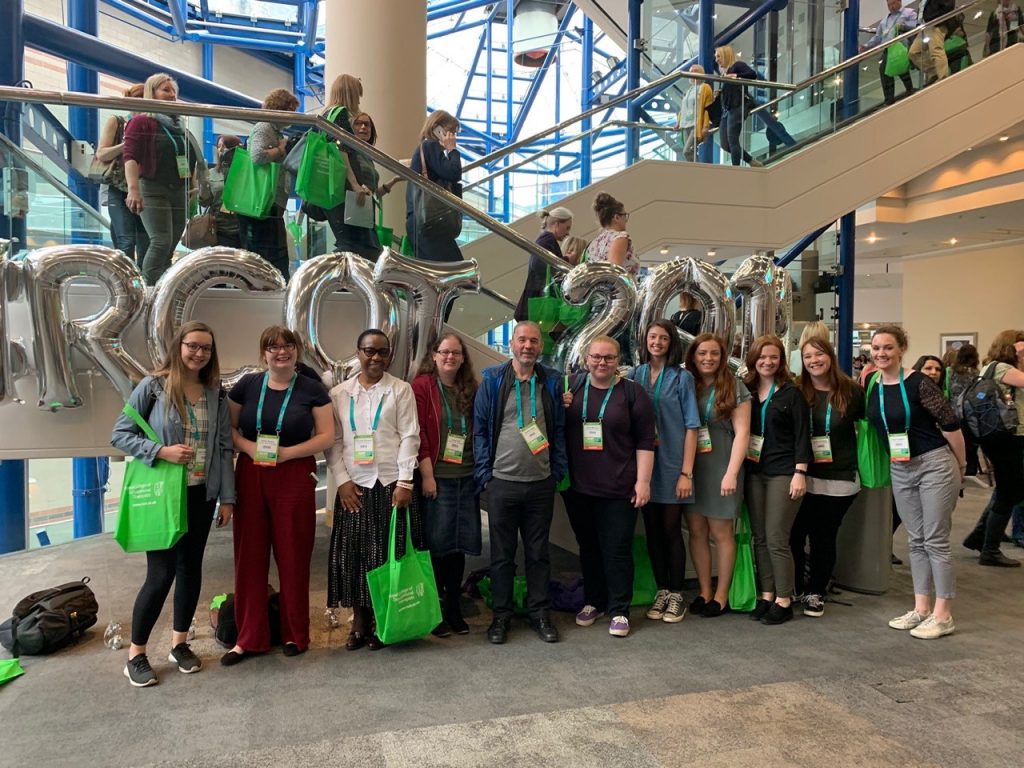10 students, and one member of staff, attended this conference this year. It was great to see students from across all cohorts, and across both BSc and MSc programmes, attend. It is exciting that 22 final year students had their work presented at this year’s conference!
In this first blog, Patronella Kagodora shares her reflection of attending her first conference at the end of her first year on BSc programme………………..
What did you hope to gain from attending the conference?
I was so keen to attend RCOT (2019) annual conference because I wanted to network with other students from different universities, to see the exhibitors, talk to them about their products, meet new people. Also to gain knowledge from other Occupational Therapists working in different disciplines.
How was your experience?
Listening to the presentation by Stephen Wey (York St John University lecturer) and students (Kaitlin Gallighan, Amy Crisford, Emily Rivers, Lauren Hill and Laura Edwards) made me appreciate how important it is to ‘help people to live not exist‘. The presentation was about occupational engagement:a family of four playing a game of scrabble. One of the participants is living with dementia. Everyone participated in the game, there was no support offered to the person with dementia, or adjustments to the game to help them engage more meaningfully. I liked the idea that the person was involved in the interaction of the game and this created conduits for participants to attune themselves to one another in order to promote mutual participation and meaning. This presentation highlighted to me the importance of promoting independence and enabling participants to maintain valuable occupations. I remember as a child we used to play a game called ‘tsoro‘ in my language, this is a bit similar to a game of scrabble. This game is played in twos and it is a mathematical strategy board game using small stones which we put into four small row and 21 columns. The game requires the children to be able to count and involves hand and eye co-ordination, dexterity, manipulation and cognitive skills. We used to play this game with my grandmother. My mother would say ‘give granny the chance to win’ and we would pretend granny has won and we would give her an applause and sweets for winning and she would cheer up and be happy and this kept her wanting to play more. Back then, I did not realise my grandmother had dementia: my mum understood that we needed to include her in all aspects of life: cooking, cleaning the house even making her own bed- despite her illness we treated her and valued her as part of the family. I now understand my grandmother got her identity, sense of of accomplishment and participation from this involvement. My personal experience of playing family games was similar to those playing the game of scrabble discussed in this presentation. The family valued the person as part of the family, showed respect for them, and love, by being included in the family’s routines. This reminded me of the Model of Human Occupation (MOHO) as it addresses how and why we engage in meaningful daily activities such as play. I learnt that co-occupation is a shared meaning, holistic in the sense that physical and mental well-being come together.
Do you have a highlight from the conference?
Seeing so many Occupational Therapists from different disciplines attending the conference and who are so enthusiastic about their profession was a highlight for me. I met staff from my previous placement, and we hugged, laughed and joked and we talked about my time whilst I was on placement and I was so happy to meet them. Highlights include attending sessions called ‘Primary care has rich soil: growing a future workforce through role emerging placements” by Dr Juliette Truman, ‘Supporting occupational therapy students to become ‘agents of change’ in their local communities’ by Sarah Harvey and “Stalking as a meaningful occupation” by Sam Baker. This opened my eyes to areas I never thought about getting involved in, especially the role emerging placements for students. There is so much to learn within the profession!
What advise would you give to other students about attending conferences?
I do recommend that students attend their regional RCOT conferences as well as the national RCOT conferences. You learn, you network, and seeing is believing. l love Occupational Therapy – we are unique, talented, diverse and inclusive.

